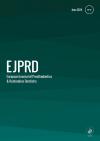European Journal of Prosthodontics and Restorative Dentistry
Denture Adhesives Associated with Silver Vanadate: Antimicrobial Approach Against MultiSpecies Biofilms on Acrylic Resin Surfaces
Abstract
Alternatives have been sought to add an antimicrobial property to denture adhesives. This study evaluated the antimicrobial potential of adhesives associated with nanostructured silver vanadate decorated with silver nanoparticles (β-AgVO3). Specimens in acrylic resin were treated with the adhesives associated with β-AgVO3 (1%, 2.5%, 5% and 10%). As control, specimens treated only with Ultra Corega Cream (UCC) or Ultra Corega Powder (UCP) adhesive were used. Multispecies biofilm of Candida albicans, Candida glabrata, Streptococcus mutans and Staphylococcus aureus was evaluated by counting colony forming units per milliliter (CFU/mL), colorimetric assay and fluorescence microscopy. The data were analyzed using the two-way analysis of variance (ANOVA) and
Bonferroni multiple comparisons test (α=0.05). For both adhesives, a small amount of β-AgVO3 (1%) completely inhibited S. mutans (P<0.05). For the other microorganisms, there was a reduction in metabolic activity and complete inhibition in the groups with intermediate or greater amounts of nanomaterial (P<0.05), except for C. albicans, which was reduced (P<0.05) but not completely inhibited in UCP. Microscopy that showed less biofilm in the groups with β-AgVO3 and in the UCC than UCP. Denture adhesives in powder and cream form with β-AgVO3 showed potential antimicrobial activity against multispecies biofilm. Powder adhesive showed higher biofilm formation.
Keywords
Silver
Nanostructures
Denture
Biofilms
Vanadate
Authors
Andrea C. dos Reis, Marco A. Schiavon, Viviane de C. Oliveira, Izabela Ferreira, Denise T. de Castro
Articles from this issue
 Free Access
Free Access No Access
No Access Full Access
Full Access


